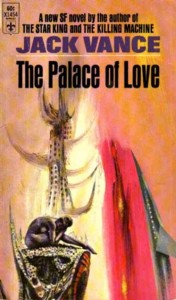Being quotations from A Princess of Mars.
From CHAPTER XII:
While the court was entirely overgrown with the yellow, moss-like vegetation which blankets practically the entire surface of Mars, yet numerous fountains, statuary, benches, and pergola-like contraptions bore witness to the beauty which the court must have presented in bygone times, when graced by the fair-haired, laughing people whom stern and unalterable cosmic laws had driven not only from their homes, but from all except the vague legends of their descendants.
From CHAPTER XV:
We made a most imposing and awe-inspiring spectacle as we strung out across the yellow landscape; the two hundred and fifty ornate and brightly colored chariots, preceded by an advance guard of some two hundred mounted warriors and chieftains riding five abreast and one hundred yards apart, and followed by a like number in the same formation, with a score or more of flankers on either side; the fifty extra mastodons, or heavy draught animals, known as zitidars, and the five or six hundred extra thoats of the warriors running loose within the hollow square formed by the surrounding warriors. The gleaming metal and jewels of the gorgeous ornaments of the men and women, duplicated in the trappings of the zitidars and thoats, and interspersed with the flashing colors of magnificent silks and furs and feathers, lent a barbaric splendor to the caravan which would have turned an East Indian potentate green with envy.
The enormous broad tires of the chariots and the padded feet of the animals brought forth no sound from the moss-covered sea bottom; and so we moved in utter silence, like some huge phantasmagoria, except when the stillness was broken by the guttural growling of a goaded zitidar, or the squealing of fighting thoats. The green Martians converse but little, and then usually in monosyllables, low and like the faint rumbling of distant thunder.
We traversed a trackless waste of moss which, bending to the pressure of broad tire or padded foot, rose up again behind us, leaving no sign that we had passed. We might indeed have been the wraiths of the departed dead upon the dead sea of that dying planet for all the sound or sign we made in passing. It was the first march of a large body of men and animals I had ever witnessed which raised no dust and left no spoor; for there is no dust upon Mars except in the cultivated districts during the winter months, and even then the absence of high winds renders it almost unnoticeable.

